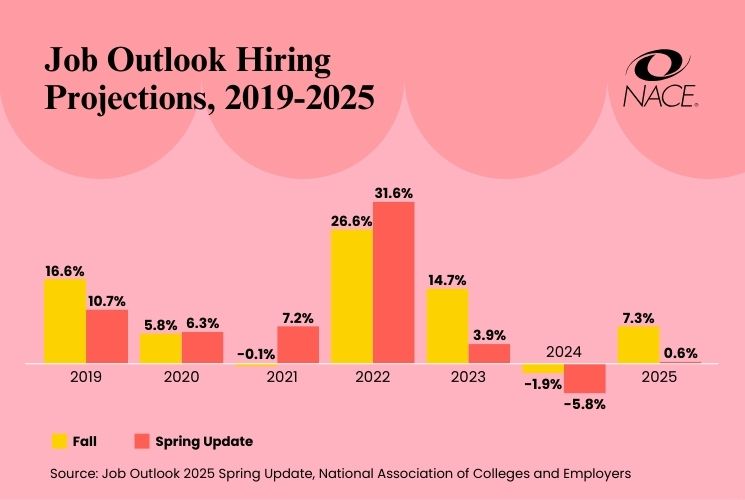Employers Expect Hiring to Level Off for the College Class of 2025
Employers Expect Hiring to Level Off for the College Class of 2025
“The overall change from the early hiring projections is largely driven by more companies deciding to maintain their hiring and greater decreases by some larger companies in various industries,” says
Shawn VanDerziel, NACE’s president and chief executive officer.
“That said, most industries are hiring, but because the market is tightening, there will be more competition for jobs. There are steps college students can take to enhance their attractiveness to potential employers. This starts with inventorying their knowledge, skills, and abilities and thinking broadly about how they can directly meet the needs of the jobs for which they are applying.”
Instead, many are using skills-based hiring to help them identify candidates with potential.
“Whether or not they screen by GPA, employers hiring for entry-level positions report that they strongly consider a student’s major, industry, and internship experience. These are key areas where students gain, hone, and demonstrate they have the skills necessary to successfully move into the workplace,” VanDerziel explains.
Nearly two-thirds of employers indicate they use skills-based hiring practices for entry-level professional positions. Among this group, more than 65% report using skills-based hiring practices all or most of the time.
“Because employers use skills-based hiring most often when interviewing and screening candidates, students need to put their skills front and center on their resume and in the interview to connect their coursework, projects, internships, and other experiences to demonstrate the skills employers are seeking,” VanDerziel explains.
“How can students identify the skills that are important to employers? Many employers tailor their job descriptions to let candidates know exactly what skills they want.”


About the Job Outlook 2025 Spring Update Report: The
Job Outlook 2025 Spring Update survey was conducted from February 18 – March 21, 2025. Of the 216 total respondents, 176 were NACE employer members, representing 22.2% of eligible member respondents. The Job Outlook 2025 Spring Update survey was also distributed to nonmember companies; this group provided an additional 40 responses. The survey updates hiring projections for the Class of 2025; those projections were collected from NACE employer members from August 5 – September 16, 2024, and were reported in
Job Outlook 2025, which was published in November 2024. The
Job Outlook 2025 Spring Update report is presented in slide format;
it is available for download on NACEWeb.
About the National Association of Colleges and Employers: Established in 1956, the
National Association of Colleges and Employers (NACE) is the only professional association in the United States that connects more than 13,000 college career services professionals, more than 3,800 early career talent acquisition professionals, and more than 400 business solution providers that serve this community.
NACE is the premier source of market research on
career readiness, the
employment of recent college graduates, and the college-to-career transition. NACE forecasts hiring and trends in the job market; tracks salaries, recruiting and hiring practices, and student attitudes and outcomes; and identifies best practices and benchmarks.

